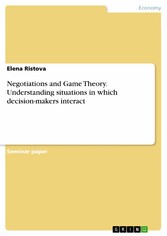Suchen und Finden
Service

Negotiations and Game Theory. Understanding situations in which decision-makers interact
Elena Ristova
Verlag GRIN Verlag , 2020
ISBN 9783346203915 , 11 Seiten
Format PDF
Kopierschutz frei
Geräte
Mehr zum Inhalt

Negotiations and Game Theory. Understanding situations in which decision-makers interact
Seminar paper from the year 2014 in the subject Economics - International Economic Relations, grade: 1,7, Pforzheim University, language: English, abstract: This paper is about negotiations and the game theory. Negotiation has been since ever omnipresent. It can confront us in our daily life, for example the question who is doing the dishes today or in much more complex is-sues, such as in economics or politics. 'Simply defined, negotiation is the process of attempting to get what one wants, through agreement with one or more other par-ties.' There are different tools with which negotiations can be modeled. One of them is game theory. 'GAME THEORY aims to help us understand situations in which decision-makers interact. A game in the everyday sense - a competitive activity in which players contend with each other according to a set of rules.' According to the definition, game theory is an appropriate tool to apply for negotiations and get the best outcome of it. It can make it easier for us to analyze our own needs, the least acceptable agreement, and desires, the most desired outcome, but also the ones of our opponent. Consequently, game theory allows us to estimate the strategy the other party is going to use. Moreover, game theory reaches back far in history. There had been recognized some game theoretic situations even in the bible. But the major development started in the 1920s. First, game theory was a mathematic discipline. The two mathematicians, John von Neumann and Emile Borel worked on game theory and subsequently the book Theory of games and economic behavior was published by von Neumann and Oskar Morgenstern in 1944. Later, in the 1950s, game theory was not only considered to be a mathematician discipline, but it has been also applied in 'economic theory and political science, and psychologists began studying how human subjects behave in experimental games.'
Shop

